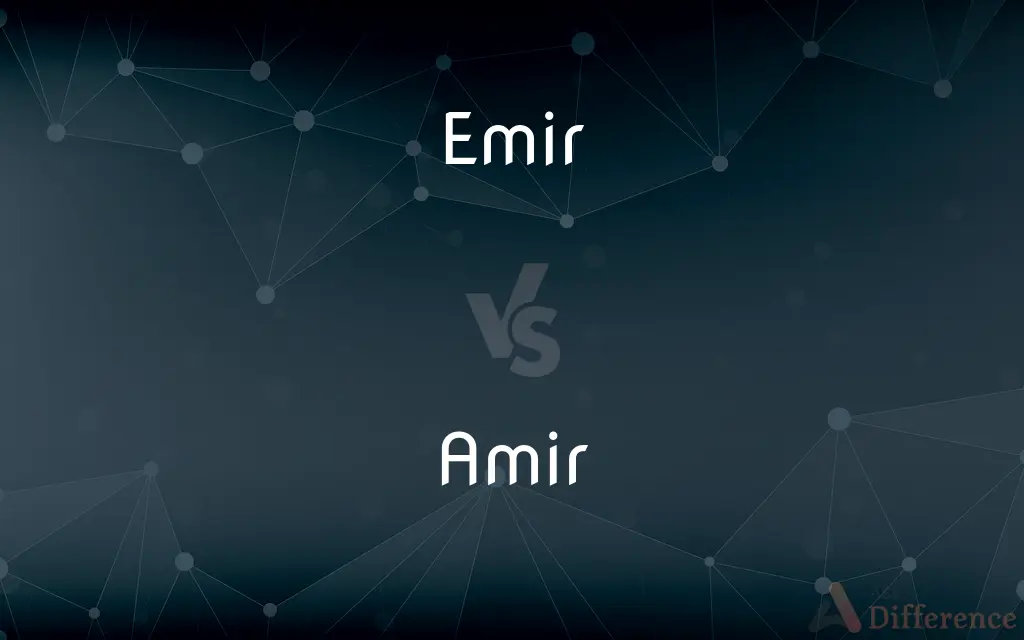Emir vs. Amir — What's the Difference?
By Tayyaba Rehman & Maham Liaqat — Updated on May 6, 2024
Emir and Amir both refer to a title of high office, often in a Muslim state, with variations largely in regional spelling preferences.

Difference Between Emir and Amir
Table of Contents
ADVERTISEMENT
Key Differences
The term "Emir" is commonly used in Arabic-speaking countries to denote a high-ranking leader or noble. It is especially prevalent in the context of those who are commanders or rulers, often in a historical or contemporary Islamic state. On the other hand, "Amir" represents the same concept but is often used in Persian and some other Turkic and Indo-European languages. It too refers to a leader or noble, but the spelling difference indicates regional linguistic preferences.
In certain regions, "Emir" specifically refers to the ruler of a specific territory, such as an Emirate, which is a political territory often ruled by a monarchical figure. Whereas, "Amir" might be used more broadly to refer to any leader or commander, not necessarily linked to the governance of an Emirate.
The usage of "Emir" can also be seen in formal titles combined with other words to indicate authority, such as "Emir al-Mu'minin" (Commander of the Faithful). On the other hand, "Amir" can be compounded similarly, like "Amir al-Bahr" (Commander of the Sea), indicating a specific charge or command within a military or governmental hierarchy.
In contemporary settings, "Emir" is a title used in a more restricted and specific sense in certain countries, particularly in the Arabian Peninsula. Conversely, "Amir" is also used in modern contexts but can be found in a variety of regions, extending its application beyond a strict monarchical or noble context.
The pronunciation and spelling variations between "Emir" and "Amir" also reflect the influence of local dialects and linguistic evolution in different Islamic cultures. While both terms are recognized and understood across the Muslim world, their usage can signify subtle regional and cultural affiliations.
ADVERTISEMENT
Comparison Chart
Regional Usage
Arabic-speaking regions
Persian, Turkic, and other Indo-European regions
Context
Often used for rulers of Emirates
Broader use as leader or commander
Formal Titles
Emir al-Mu'minin (Commander of the Faithful)
Amir al-Bahr (Commander of the Sea)
Contemporary Relevance
Used in specific countries like UAE
Used more broadly in various Islamic regions
Linguistic Influence
Reflects Arabic dialects
Reflects Persian and other regional dialects
Compare with Definitions
Emir
Used specifically for the ruler of an emirate.
The Emir presided over the council meeting.
Amir
Part of compound titles showing specific duties.
Amir al-Bahr played a crucial role in naval strategy.
Emir
Reflects Arabic linguistic preferences.
In Arabic dialects, the pronunciation of Emir varies.
Amir
Used in both contemporary and historical contexts.
Amir is a common name derived from the historical title.
Emir
A title for a high-ranking noble or leader in an Islamic country.
The Emir of Kuwait has significant influence in regional politics.
Amir
A noble or commander in various Islamic states.
Amir was appointed as the leader of the fleet.
Emir
Historical military leader or commander.
The Emir led his troops to victory.
Amir
Shows linguistic variations across regions.
In Persian, Amir also means prince.
Emir
A term used in titles to denote authority.
The title Emir al-Mu'minin is highly respected.
Amir
Can indicate a military or civil leader.
The Amir of the region made several reforms.
Emir
Emir (; Arabic: أمير ʾamīr [ʔaˈmiːr]), sometimes transliterated amir, amier, or ameer, is a word of Arabic origin that can refer to a male monarch, aristocrat, holder of high-ranking military or political office, or other person possessing actual or ceremonial authority. The title has a long history of use in the Arab World, East Africa, West Africa, Afghanistan, and the Indian subcontinent.
Amir
Variant of emir.
Emir
A prince, chieftain, or governor, especially in the Middle East.
Amir
Alternative form of emir
Emir
A prince, commander or other leader or ruler in an Islamic nation.
Amir
Same as Ameer.
Emir
A descendant of the prophet Muhammad.
Amir
An independent ruler or chieftain (especially in Africa or Arabia)
Emir
An Arabian military commander, independent chieftain, or ruler of a province; also, an honorary title given to the descendants of Mohammed, in the line of his daughter Fatima; among the Turks, likewise, a title of dignity, given to certain high officials.
Emir
An independent ruler or chieftain (especially in Africa or Arabia)
Common Curiosities
What does Emir mean?
Emir is a title used for a noble or leader, often the ruler of an emirate within an Islamic context.
Is there a difference in the level of authority between an Emir and an Amir?
The level of authority can vary, but generally, both titles refer to a high-ranking position, often in a leadership or noble capacity.
Can Amir be a personal name?
Yes, Amir is also a popular personal name across various Muslim-majority countries.
How is Amir different from Emir?
Amir and Emir essentially have the same meaning, but "Amir" is more commonly used in Persian and other regional languages.
What historical roles did Amirs have?
Historically, Amirs were military commanders and also held governmental authority in various Islamic states, often responsible for large territories.
What is the significance of the title Emir in modern politics?
In modern politics, the title Emir signifies a constitutional and ceremonial leader in certain countries, such as in monarchies of the Arabian Peninsula.
How is the title Amir used in literature?
In literature, Amir is often depicted as a noble leader, reflecting qualities of bravery, leadership, and wisdom, and is used to characterize historical or legendary figures.
In which countries is the title Emir used?
The title Emir is commonly used in Arab countries, particularly in the Arabian Peninsula.
Can women hold the title of Emir or Amir?
Traditionally, the titles Emir and Amir are held by men, but the female equivalent in some regions is "Emira" or "Amira."
What are the common duties of an Emir?
An Emir typically has administrative, military, and sometimes religious duties, primarily overseeing the governance of an emirate.
What is the role of language in differentiating the titles Emir and Amir?
Language plays a crucial role, with "Emir" primarily used in Arabic contexts and "Amir" in Persian and other linguistic contexts, reflecting regional linguistic traditions.
How does one become an Emir or Amir?
Becoming an Emir or Amir usually involves succession by heritage in monarchies or appointment based on merit and leadership qualities in other contexts.
Is the title Amir used in non-Islamic contexts?
The title Amir, while predominantly used in Islamic contexts, can also be found in historical or cultural narratives outside of Islam, often borrowing from its original meanings.
Are there any religious connotations associated with the titles Emir and Amir?
Yes, both titles can carry religious connotations, especially when used in titles like "Emir al-Mu'minin," meaning Commander of the Faithful, a title for leaders in the Islamic community.
Are the titles Emir and Amir interchangeable in daily speech?
While they can be interchangeable in some contexts due to their similar meanings, regional preferences usually dictate the usage of one over the other.
Share Your Discovery

Previous Comparison
Cash vs. Encashment
Next Comparison
Submissive vs. SubAuthor Spotlight
Written by
Tayyaba RehmanTayyaba Rehman is a distinguished writer, currently serving as a primary contributor to askdifference.com. As a researcher in semantics and etymology, Tayyaba's passion for the complexity of languages and their distinctions has found a perfect home on the platform. Tayyaba delves into the intricacies of language, distinguishing between commonly confused words and phrases, thereby providing clarity for readers worldwide.
Co-written by
Maham Liaqat















































